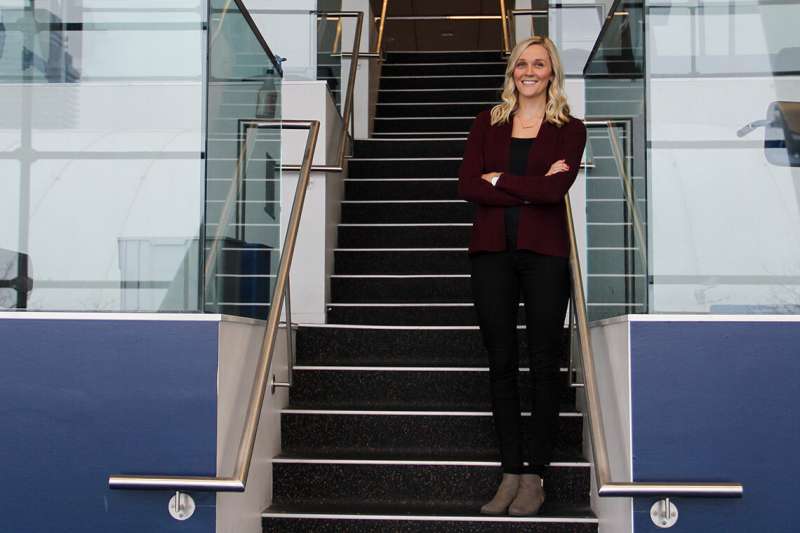How much exercise do you need? Not much if you're diligent, U of T researcher says

Jenna Gillen is helping change the way we think about exercise.
A recently appointed assistant professor at the University of Toronto's Faculty of Kinesiology & Physical Education (KPE), Gillen has been interested in exercise and nutrition for as long as she can remember.
Her research is helping to answer several important questions, including: How much exercise is required to improve health?
A surprisingly small amount, if you're willing to work hard, she says.
"Breaking up prolonged periods of sitting with short – less than five minutes – repeated exercise 'snacks' can lower blood sugar throughout the day," says Gillen.
Examples for healthy adults include: walking for two minutes every 30 minutes and brief bouts of stair-climbing.
"Similarly, performing one structured exercise session after a meal can immediately lower the rise in blood sugar from breakfast, lunch and dinner," says Gillen. "Best of all, once regular exercise becomes a normal part of your weekly routine, muscle becomes more sensitive to blood sugar and is capable of consuming more of it – even on days when you're not exercising."
Gillen recently spoke to KPE's Elaine Evans about her research interests and findings.
Tell us about your research.
I am interested in understanding how exercise and nutrition impact carbohydrate and fat metabolism, and identifying lifestyle strategies to improve metabolic health. This ranges from conducting studies in healthy adults to those at risk for, or afflicted with, metabolic disease. We are interested in practical questions relating to the importance of exercise dose (intensity vs. duration), mode (aerobic vs. resistance), and timing (before vs. after a meal) on key measures of health and performance.
What do you hope to achieve?
I hope to contribute to our understanding of how different exercise and nutritional strategies impact metabolism, health and performance. We know regular exercise reduces your risk for many chronic diseases, but there are still many unanswered questions regarding the best strategy. I am particularly interested in optimizing guidelines for women, and also hope to test some of our strategies in a community setting to determine their effectiveness in the real world.
Your research is challenging some norms in the world of exercise.
My research has questioned some ideas regarding the amount of exercise required to improve health. We've shown that brief but intense exercise – known as high-intensity interval training –can lead to many health benefits that we normally associate with longer durations of moderate-intensity exercise. Many individuals cite a lack of time as a barrier to regular exercise, so it's important to identify time-efficient options that are still effective. Our work shows that if you're willing to work hard, you can get away with a surprisingly small amount of total exercise.
Why did you want to be part of the KPE faculty?
We have such a multidisciplinary faculty with a wide range of expertise. I see many opportunities to build on existing collaborations with exercise physiologists, and also to develop new connections with researchers interested in psychosocial aspects of physical activity. I think we are able to better address important research questions with the collective expertise we have in this faculty.
What will you be teaching?
I will be teaching a new course called Lifestyle and Metabolic Disease. A major focus is for students to learn how lifestyle strategies incorporating exercise and nutrition can help to prevent and/or treat metabolic disease. By learning the underlying physiology, students will be able to critically evaluate health claims that we are often presented with for scientific accuracy.




















